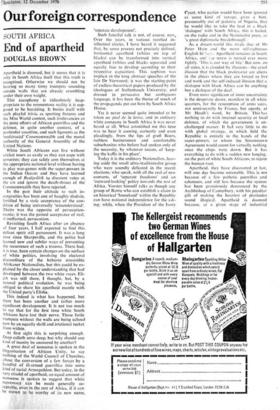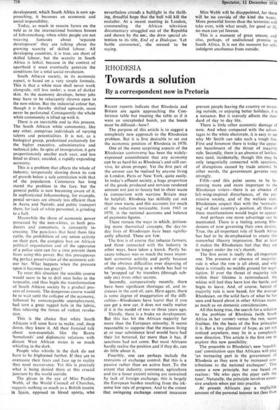Our foreign correspondence
SOUTH AFRICA
End of apartheid
DOUGLAS BROWN
Apartheid is doomed, but it seems that it is only in South Africa itself that this truth is recognised. Otherwise we should not be hearing so many tinny trumpets sounding outside walls that are already crumbling under their own weight.
This cacophony is ridiculously inap- propriate to the momentous reality it is sup- posed to be heralding. It busies itself with such playful trivia as sporting fixtures and the Miss World contest, such irrelevancies as the puny efforts of African guerrillas and the defence, in quite another context, of a particular: coastline, and such figments as the 'multiracial' Commonwealth and the moral authority of the General Assembly of the United Nations.
White South Africans can live without cricket tours as easily as they can cope with terrorists; they can safely arm themselves at the appropriate national level without having to play war-games with the super-powers in the Indian Ocean; and they have learned enough of Realpolitik to discount votes at. the UN and ignore the death-throes of the Commonwealth they have rejected.
In the past their attitude to such in- congruities has been one of haughty disdain, fortified by a stoic acceptance of the con- dition of being universally 'misunderstood'. Theirs was -the opposite of persecution- mania; it was the pained acceptance of real, if ineffectual, persecution.
Revisiting South Africa after an absence of four years, I half expected to find this. defiant spirit still paramount. It was a long time since Sharpeville, and the police had learned new and subtler ways of preventing the recurrence of such a trauma. There had, it is true, been certain changes on the surface of white politics, involving the electoral discomfiture of the hitherto irresistible Afrikaner Nationalists, but this could be ex- plained by the closer understanding that had developed between the two white races. Eli- jah was still there, I thought, but, by a natural political evolution, he was being obliged to share his apartheid mantle with the United party's Elisha.
This indeed is what has happened, but there has been another and rather more significant development. It is not too much to say that for the first time white South Africans, have lost their nerve. Those futile trumpets without the walls are being echoed now by an equally shrill and irrational tucket from within.
At first sight this is surprising enough. Deep calleth unto deep, but why should one kind of inanity be answered by another?
A great deal of nonsense is spoken in the Organisation of African Unity, to say nothing of the World Council of Churches, about the conversion of a few forays by a handful of ill-armed guerrillas into some kind of racial Armageddon. But today, in the very citadel of apartheid, an equal amount of nonsense is spoken to suggest that white supremacy can be made generally ac- ceptable, even in the rest of Africa, if it can be shown to be worthy of its new name, `separate development'.
Such fanciful talk is not, of course, new, Over the years, in various rarefied in- tellectual circles, I have heard it suggested that, by some process not precisely defined, horizontal apartheid (whites on top of blacks) can be transformed into vertical apartheid (whites and blacks separated and equally free to develop according to their respective capacities). This sophism was implicit in the long abstract speeches of the late Dr Verwoerd; it was the starting-point of endless theoretical papers produced by the ideologues of Stellenbosch University; and dressed in persuasive but ambiguous language, it has been the theme of much of the propaganda put out here by South Africa House.
Yet it never seemed quite intended to be taken au pied de la Imre, and in ordinary white company in South Africa it was never heard at all. What astonished me this time was to hear it coming, earnestly and even pleadingly, from the lips of gruff Boers, ruthless businessmen and comfortable suburbanites who before had spoken only of the necessity, by whatever means, of 'keep- ing the kaffir in his place'.
Today it is the ordinary Nationalists, leav- ing aside the small ultra-traditionalist group who were soundly defeated in the recent elections, who speak, with all the zeal of new converts, of 'separate freedoms' and an 'outward-looking' policy towards the rest of Africa. Vorster himself talks as though any group of Bantu who can establish a claim to an historical 'homeland' within the Republic can have national independence for the ask- ing; while, when the President of the Ivory Coast, who earlier would have been ignored as some kind of savage, gives a hint, presumably out of jealousy of Nigeria, that he would like to take the lead in a black 'dialogue' with South Africa, this is hailed, on the radio and in the Nationalist press, as 'a great diplomatic breakthrough'.
As a dream-world this rivals that of Mr Peter Hain and the more self-righteous English bif-7top.:. Apartheid remains in South Africa, and tie screw is turned ever more tightly. 'This is our way of life.' But now, on all sides, it is clouded by illusions—the cruel illusion that the black proletariat are aliens in the places where they are forced to live and work and the self-induced illusion that a dialogue with black Africa can be anything but a dialogue of the deaf.
Even more significant of inner uncertainty is the desperate desire, manifest in all white quarters, for the resumption of arms sales, not semi-secretly by France, but openly, at Mr Heath's word, by Britain. This has nothing to do with internal security or local defence, of which the government is un- challenged master. It hag very little to do with global strategy, in which field the Republic is entirely in the hands of the super-powers. to whom the Simonstown Agreement would count for virtually nothing once the chips were down. But it has everything to do with a sudden new longing, on the part of white South Africans, to rejoin the human race.
Apartheid, they have discovered at last, will one day become untenable. This is not because of a few pathetic guerrillas and saboteurs, and still less because the system has been gratuitously denounced by the Archbishop of Canterbury, with his peculiar gift of making the hoariest of platitudes sound illogical. Apartheid is doomed because, at a given stage of industrial development, which South Africa is now ap- proaching, it becomes an economic and social impossibility.
Today, as much in remote farms on the veld as in the international business houses of Johannesburg, when white people are not weaving fantasies about 'separate development' they are talking about the growing scarcity of skilled labour. AU developing countries, it is true, are short of skilled labour, but the scarcity in South Africa is lethal, because in the context of apartheid it must eventually generate the conditions for a total social revolution.
South African society, in its economic aspect, is based on a very simple formula.
This is that a white man shall never work alongside, still less under, a man of darker skin. As the economy develops, better jobs may have to be reluctantly thrown open to the non-whites. But the industrial colour bar, though it is thereby shifted upwards, must never be perforated. Consequently the whole white community is lifted up with it.
There is an inevitable end to this process. The South African white community, like any other, comprises individuals of varying talents and potentialities. It is not, as a biological group, predestined exclusively for the higher executive, administrative and technical jobs. In spite of immigration, it gets proportionately smaller each year, and less fitted to direct, unaided, a rapidly expanding economy.
This is a problem that affects the whole of industry, temporarily slowing down its rate of growth below a safe correlation with that of the population. Commerce - has long stared the problem in the face, but the general public is now becoming aware of it.
In sophisticated Johannesburg, for example, postal services are already less efficient than in Accra and Nairobi, and public transport there, for lack of white personnel, is grinding to a halt.
Meanwhile the share of economic power possessed by the non-whites, as both pro- ducers and consumers, is constantly in- creasing. The pass-laws that herd them like cattle, the prohibition of any union activity on their part, the complete ban on African political organisation and all the apparatus of a police state can for a time prevent them from using-this power. But this presupposes the perfect preservation of the economic col- our bar. What happens when the pressure upon it becomes too great?
To meet this situation the sensible course would seem to be to drill neat holes in the tarpaulin, and thus begin the transformation of South African society by a gradual pro- cess of osmosis. The dangerous course would be to wait until the collapse of the economy, followed by unmanageable unemployment, had torn a great ragged hole in the fabric, thus releasing the forces of violent revolu- tion.
This is the choice that white South Africans will soon have to make, and, deep down, they know it. All their frenzied talk . about non-essentials like the Bantu 'homelands' and diplomatic relations with distant West African states is so much whistling in the dark.
People who whistle in the dark do not have to be frightened further. If they are to overcome their fears and face up to reality they need reassurance. Yet this is precisely what is being denied them at this crucial juncture by the world outside.
The gleam in the eye of Miss Pauline Webb, of the World Council of Churches, suggests nothing so much as a British tourist in Spain, opposed to blood sports, who
nevertheless attends a bullfight in the thrill- ing, dreadful hope that the bull will kill the matador. At a recent meeting in London, commending the African television documentary smuggled out of the Republic and shown by the BBC, she drew special at- tention to its title, End of a Dialogue. 'Let battle commence', she seemed to be saying.
Miss Webb will be disappointed, for there will be no corrida of the kind she wants. More powerful forces than the terrorists will take over, with what result, for good or ill, no man can yet foresee.
This is a moment of great unease, and also, perhaps, of undisclosed promise in South Africa. It is not the moment for self- indulgent anathemas from outside.











































 Previous page
Previous page